Recycling or Innovation?
Preview of BASF´s K 2019 Innovations
Many companies are working on improving the recyclability of plastics; BASF is contributing with the innovative ChemCycling project.
ChemCycling
More and more companies from the plastics industry are working on improving the recyclability of plastics and thus helping to create a circular economy. One way that BASF is contributing is the ChemCycling project: at the end of 2018 the company first used pilot volumes of a pyrolysis oil derived from plastic waste as a feedstock in its own production.
The pilot projects showed that products made with chemically recycled raw materials exhibit the same high quality and performance as products made from primary materials. ChemCycling uses a mass balance approach to mathematically allocate a share of the recycled material to the final product to achieve sustainability. The certified products are indicated with the addition of “Ccycled” to their name.
To move from the pilot phase to market roll-out, however, various issues will need to be resolved. The existing technologies for transforming waste plastics into recycled raw materials must be advanced and adapted for the use at industrial scale, in order to ensure the consistently high quality of the pyrolysis oil. Besides the technical issues, economic aspects also play a role. For chemical recycling to find acceptance in the market, regulators must also recognize the process officially as recycling. Within this framework, they have to define how chemical recycling and mass balance approaches can be included in the calculation of recycling rates required by law.
“With the ChemCycling project, BASF is aiming to process pyrolysis oil derived from plastic waste that currently cannot be recycled, such as mixed or contaminated plastics. If we are successful in developing the project to market readiness, ChemCycling will be an innovative complement to existing processes for recycling and recovery to solve the plastic waste problem” – Stefan Gräter, Head of the ChemCycling Project
Future Mobility
Automobile trends, such as reduced emissions, electrification and automated driving, will only become a reality with constant innovation.
Flame-retardant plastics are indispensable to reduce the weight and installation space required for high-voltage components. Special polyamide (PA) and polybutylene terephthalate (PBT) grades from BASF can be used as halogen-free, flame-retardant materials to give high-voltage components both inside and outside of electric drive trains the exact properties required.
Today’s electronic drive systems are still primarily part of the metals industry. Until now, manufacturers of electronic motors and power electronic components have been using housing made of steel or die-cast aluminum. As many of the components are now actively cooled, meaning that heat no longer needs to be dissipated via the housing, plastic solutions are now a possibility for a lightweight construction. Housings that contain high-voltage electric components must be electrically shielded to prevent compromising the surrounding area. Metal coatings on the plastic housing parts are one of the possible solutions that BASF is pursuing. Coating in this way can provide good shielding of the magnetic field. In addition, engineering plastics offer the advantage of integrating additional functions into the component, besides being lighter and more economical than die-cast aluminum housings.
In addition to electromobility, highly automated driving will also revolutionize tomorrow's vehicles. In driverless vehicles, the interior will become an extended living room. The number of sensors will increase significantly, relieving drivers of many driving tasks. BASF has already contributed to several sensitive electronic sensor technologies with its portfolio of hydrolytically resistant PBT grades.











